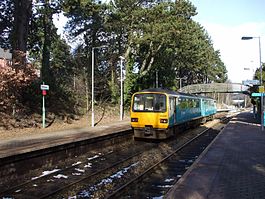Hengoed railway station
| Hengoed |
|
|---|---|
 |
|
| Location | |
| Place | Hengoed |
| Local authority | Caerphilly |
| Grid reference | ST153949 |
| Operations | |
| Station code | HNG |
| Managed by | Arriva Trains Wales |
| Number of platforms | 2 |
| DfT category | F2 |
| Live arrivals/departures, station information and onward connections from National Rail Enquiries |
|
| Annual rail passenger usage* | |
| 2011/12 |
|
| 2012/13 |
|
| 2013/14 |
|
| 2014/15 |
|
| 2015/16 |
|
| History | |
| Key dates | Opened 1858 |
| National Rail – UK railway stations | |
| * Annual estimated passenger usage based on sales of tickets in stated financial year(s) which end or originate at Hengoed from Office of Rail and Road statistics. Methodology may vary year on year. | |
|
|
|
Coordinates: 51°38′50″N 3°13′31″W / 51.6471°N 3.2254°W
Hengoed railway station is the name of an operational National Rail station situated in Hengoed, Wales, on the Rhymney Line of the Valley Lines network.
The current station was initially named Hengoed & Maesycwmmer when opened by the Rhymney Railway in 1858. Then on railway grouping into the Great Western Railway in 1923 it became known as Hengoed Low Level to avoid confusion.
The station has 4 departures per hour in each direction Mon-Sat daytimes- southbound to Caerphilly, Cardiff Central and Penarth and northbound to Bargoed. One each hour of the latter runs through to Rhymney (with extras at peak times). During the evening, the frequency drops to hourly each way and on Sundays to two-hourly (when trains run southbound to Barry Island).
Immediately adjacent, and crossing Hengoed Low Level was another station which originally shared the name Hengoed & Maesycwmmer, serving the Taff Vale Extension from Pontypool to Quakers Yard (and ultimately Neath). This station was renamed in 1923 to Hengoed High Level. The High Level station was immediately at the end of the Hengoed Viaduct, which carried the line across the Rhymney valley to Maesycwmmer. It was closed in June 1964. The line is disused, but the viaduct has been restored and is now part of the National Cycle Network. Some remains of the platforms which have also been preserved.
...
Wikipedia
